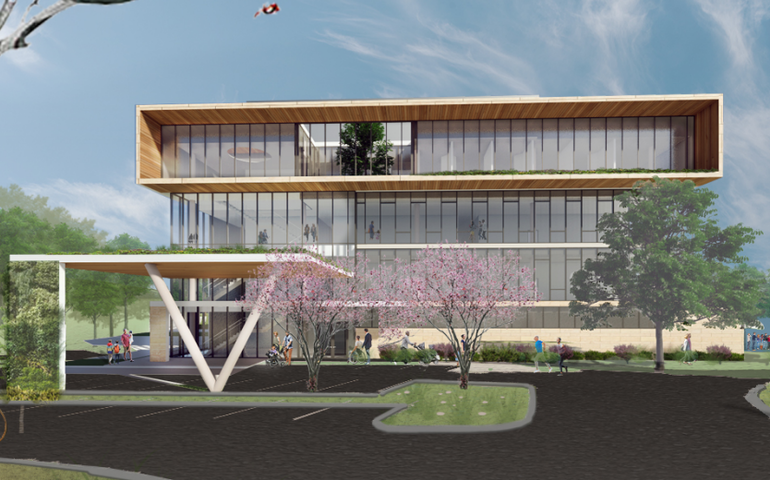A new analysis of Mass General Brigham’s proposed clinics in Westwood, Woburn and Westborough predicts that the sites will result in a “small overall decrease” in health care spending for the services they would offer, a conclusion that the hospital system views as encouraging while project opponents say it leaves out other key impacts.
As part of a broader expansion that also involves a new building at Massachusetts General Hospital and additions on the Brigham and Women’s Faulkner Hospital campus, the health system put forward a $224 million plan to open new ambulatory care centers in Westborough and Woburn and expand an existing site in Westwood.
The state’s largest hospital system, Mass General Brigham has touted the suburban expansion as a way to offer its patients services at a lower cost than at its flagship academic medical centers while also saving them a drive into Boston.
Other health care organizations and business groups that have organized against the plan argue that MGB, a more expensive provider, will threaten the financial viability of community hospitals by drawing away their commercially insured patients.
The proposals are working their way through the state’s “determination of need” process, through which the Department of Public Health vets hospital expansions and other transactions.
In March, the DPH notified Mass General Brigham that the system would be required to commission an independent cost analysis to review whether its plans align with the state’s health care cost containment goals. The notice said the department would develop questions for the analysis to address, and that the analysis “should be led by a professional with experience in health care economics and financial management.”
Analyses for the three projects — the Faulkner Hospital expansion, new Massachusetts General Hospital tower, and ambulatory care sites — were published Tuesday.
Government agencies including Attorney General Maura Healey’s office, the Center for Health Information and Analysis and the Health Policy Commission will have until Jan. 27 to comment on the analyses, as will the ten-taxpayer groups formed to weigh in on the projects. The DPH says it will consider the analyses and comments in its review and recommendations.
Prepared by the Boston-based Charles River Associates, which was jointly identified as a qualified firm by Mass General Brigham and state public health officials, the analysis for the three suburban clinics centers around the proposal’s potential effects on both “prices of and competition for health care services” and “utilization of health care services in Massachusetts and the capacity of health care providers in Massachusetts to render those services.” The analysis said such a focus is “as directed by the Determination of Need program.”
It found that a “significant fraction” of patients who live in the three sites’ service areas and had received care that would be offered at those locations had recently either gone to an MGB facility or seen an MGB primary care provider.
“The predicted changes in Mass General Brigham’s shares in the service areas of the Proposed Ambulatory Care Centers are modest and unlikely to meaningfully change the system’s bargaining leverage with health insurers,” the report said. “Rather, the weight of the economics literature suggests that allowing health care providers to enter an area or expand their presence there lowers health care prices and reduces expenditures on health care services.”
The cost analysis also found that the project would, on average, “reduce expenditures on outpatient diagnostic imaging services and outpatient surgical services for patients who switch to receiving care at the Proposed Ambulatory Care Centers,” with larger reductions if the patients would otherwise have received care at other MGB facilities.
MGB officials said in a statement that they look forward to moving ahead with the determination of need process, and that the cost analysis “confirmed” the system’s efforts to reduce patient costs and provide greater access to care.
“The three proposed projects will allow Mass General Brigham to provide high quality care to our patients, closer to their homes, at lower cost while we continue to provide world-renowned complex care at Massachusetts General Hospital and Brigham and Women’s Hospital as well as deliver more secondary care to Mass General Brigham patients at our community hospitals,” the statement said.
Groups opposing the ambulatory care expansion, banded together as the Coalition to Protect Community Care, knocked the analysis, saying they had hoped for broader scrutiny “through the lens of cost impact, community demand, and health equity across the state and in regions where MGB proposes to expand.”
“By only analyzing how the proposal will affect the costs of MGB’s present patient panel and ignoring cost-drivers, such as the recruitment of commercially insured patients from low-cost providers and increased referrals to the state’s most expensive doctors and hospitals, the ICA inadequately examines long-term implications for the entire state and leaves residents of the Commonwealth with an incomplete picture of how this ill-advised proposal would alter the state’s healthcare landscape,” a coalition spokesperson said.
The coalition said regulators and residents “deserve an impartial examination that considers evidence such as that unearthed” by Attorney General Healey, whose office in November flagged some details from its own review of documents MGB produced in response to a civil investigative demand.
Healey’s report said an expansion’s ultimate effects on costs “depends in large part on whether it shifts commercial market share to or away from higher-priced options,” and that MGB in 2018 “projected that the multi-year MGB ambulatory expansion plan would ultimately increase MGB’s share of the market for inpatient hospital services and covered lives.”
The MGB proposal — along with the larger trend of health care market consolidation — is one factor that prompted House Speaker Ronald Mariano to bring forward legislation that would impose another layer of state review on hospital system expansions, with the goal of protecting community hospitals from encroachment by large, higher-cost systems. The House passed that bill, which would grant the Health Policy Commission the authority to investigate the cost and market impact of hospital expansions, on a 158-1 vote last month.

